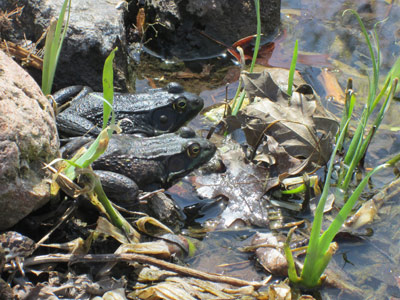A Frog Blog
I am delighted by the healthy frog population in my back yard, especially around my pond.
This year, perhaps more than any other, their song and activity is at a high pitch.
What are the frogs telling you about your land?
The frog population in every garden’s ecosystem holds great importance. Frogs indicate the health of the surrounding environment and help maintain its bio diversity. How do they do this? Many frogs need a suitable habitat both on land (terrestrial) and in the water (aquatic) to survive. This is because their skin is permeable and can absorb chemicals easily. An environmental disturbance will be indicated by a decrease in the frog population.
Their sensitivity to their surroundings will prove that if your frogs are maintaining a strong population; it’s due to the health of your land. Since frogs are so sensitive to ecological change, avoid handling frogs and direct skin contact. They won’t necessarily harm you but their epidermis (skin) absorbs moisture and chemicals from all that they come into contact with.
Manmade soaps and detergents on our hands may be too much for a frog’s system to handle and could harm them. Exposing frogs to harmful chemicals should be avoided since unfortunately these helpful creatures are in a current and drastic population decline worldwide.
How are they important to environment?
Baby frogs- “tadpoles” – act like natural nutrient filters. These little amphibians keep bodies of water (both small and large) clean by eating the algae. Once frogs develop into their adult state their taste buds change and prefer to indulge in the many bugs and pests like mosquitoes and others, many of which destroy our lovely plants or can possibly harm us. Frogs help control populations of insects and play an important role in the food chain by providing a great food source for other larger predators.
You may be thinking “Mark, I’m glad frogs help my garden’s environment but what makes this important to us humans directly?”
I’ll let you know the answer next week- so stayed turned if you want to learn how important they are to us humans, what is hurting our frogs, and how to help!




